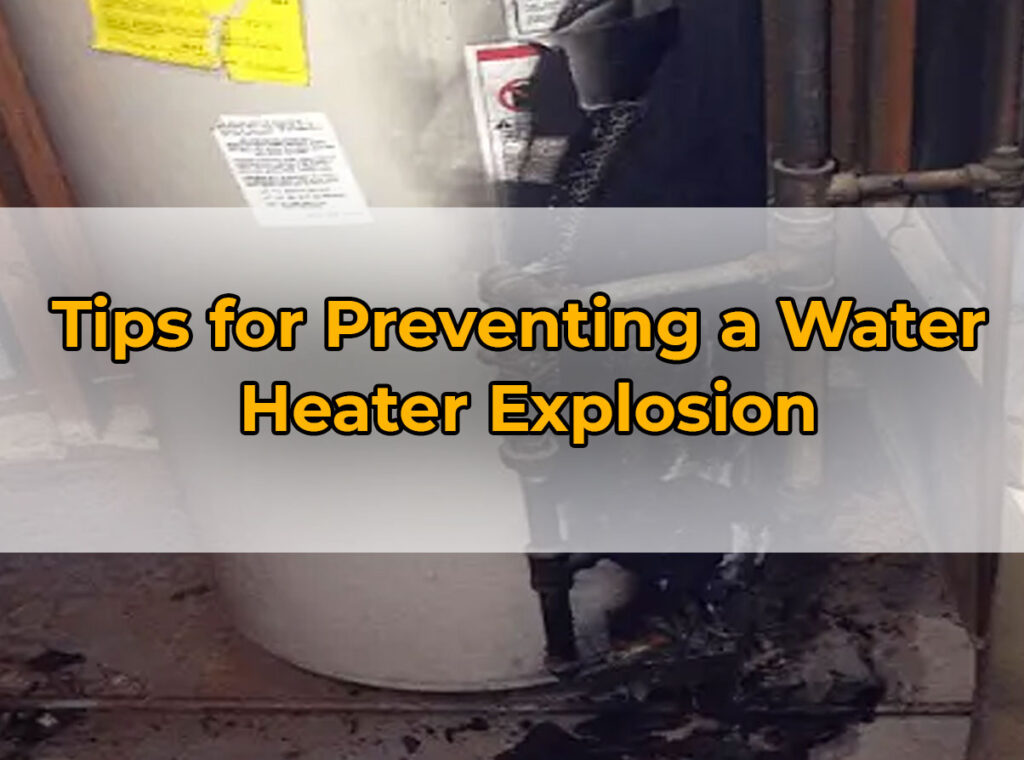Can water heater explode if turned off? Well, they have built-in safety features like pressure relief valves and temperature sensors, so no need to worry.
But, turning off the heater suddenly can cause problems. That’s why it’s important to know the right way to do it. Here is several things you will need to understand!
Can Water Heater Explode if Turned Off?

Wondering can water heater explode if turned off? Water heaters are designed to be safe even when turned off. When a water heater is turned off, it is generally not at risk of exploding.
However, it’s important to note that certain precautions should be taken when turning off a water heater or when leaving it unused for an extended period. Here are a few considerations:
1. Gas-powered water heaters
If you have a gas-powered water heater, it is crucial to turn off the gas supply when the unit is not in use or if you are leaving your home for an extended period.
This helps prevent the risk of gas leaks, which can be dangerous. Follow the manufacturer’s instructions or consult a professional to ensure you are safely turning off the gas supply.
2. Electric water heaters
Electric water heaters typically do not have a gas supply, but they should still be turned off properly when not in use for an extended period.
This involves shutting off the power supply to the water heater. Refer to the manufacturer’s instructions or consult an electrician if you are unsure about the process.
3. Drain the water heater if necessary
If you plan to leave your home for a significant period or if the water heater will remain unused for an extended time, consider draining the water heater to prevent the accumulation of stagnant water and potential issues. Draining the water heater expansion tank helps minimize the risk of corrosion and the growth of bacteria.
4. Proper reactivation
When you plan to use the water heater again after a period of being turned off or drained, follow the manufacturer’s instructions for proper reactivation. This may involve refilling the tank, turning on the gas or electricity, and allowing the unit to heat up before use.
Why Water Heater Explode?
Water heaters can explode due to a buildup of pressure and temperature inside the tank. The most common type of water heater explosion occurs in units that use a storage tank to hold and heat the water.
Here are a few reasons why water heaters can explode:
1. Excessive pressure
When a water heater is in use, it constantly heats and expands the water inside its tank. This expansion usually creates additional pressure that needs to be regulated.
To prevent dangerous levels of pressure from building up, modern water heaters are equipped with safety features such as temperature and pressure relief valves. These valves work by releasing excess pressure when it reaches a certain threshold, ensuring safe operation of the system.
2. Sediment buildup
Sediment buildup is a common problem in water heaters that often leads to unexpected and dangerous explosions. Many homeowners are unaware of the dangers associated with sediment accumulation and fail to take proper preventive measures.
Over time, minerals and debris in the water settle at the bottom, forming a layer of sediment. As this sediment layer thickens, it creates a barrier between the burner or heating element and the water, causing increased heat transfer resistance. The trapped heat then begins to build up pressure within the tank, leading to an explosion if not addressed promptly.
3. High temperature
The high temperature in a water heater can result from various factors. One possible cause is a malfunctioning thermostat that fails to regulate and maintain the desired temperature setting effectively.
As a result, the heating element continues to heat beyond what is necessary and safe for the tank’s capacity. Additionally, sediment buildup at the bottom of the tank can act as an insulator, trapping heat inside and raising temperatures significantly.
4. Gas leaks
When there is a gas leak near a water heater, it allows gas to accumulate in the surrounding area. If this gas comes into contact with an ignition source, such as a spark or flame, it can cause an explosion.
Another factor that contributes to water heater explosions is pressure buildup. Most water heaters have a pressure relief valve that helps regulate the internal pressure.
However, if this valve malfunctions or becomes blocked, it can lead to excessive pressure inside the tank. Combined with a gas leak and an ignition source, this increased pressure can result in catastrophic consequences.
Water Heater Explosion Warning Signs

It is crucial to be aware of the warning signs that may indicate an impending water heater explosion. By recognizing these signs early on, you can take necessary precautions to ensure the safety of your home and loved ones.
1. Age of the water heater
The age of your water heater is an important factor. Most water heaters have a lifespan of around 8 to 12 years.
As a water heater ages, the risk of problems, including tank failure, increases. If your water heater is approaching or exceeding its expected lifespan, it’s advisable to consider replacing it.
2. Rust or corrosion
One crucial warning sign of a potential water heater explosion is the presence of rust or corrosion on the unit. Rust and corrosion weaken the metal components of the water heater, making it more susceptible to water heater leaking or even catastrophic failure.
Rust and corrosion occur when moisture comes into contact with metal surfaces over time. When this happens inside a water heater tank, it can lead to weakened walls that may eventually rupture under pressure.
Therefore, homeowners should regularly inspect their water heaters for any signs of rust or corrosion. These warning signs can appear as discolored patches on the tank’s surface or around its connections.
If detected early on, steps can be taken to address the issue before it escalates into a potentially dangerous situation.
3. Strange noises
Listen for any unusual noises coming from your water heater! If you hear rumbling or banging sounds, it could mean that there is a buildup of sediment at the bottom of the tank.
These noises occur when the sediment gets heated and trapped, causing pressure to build up inside the tank. As a result, the tank becomes susceptible to cracks or even bursting.
4. Leaking water
Leaking water around your water heater could be a clear indication that something is wrong. This could signify a crack or fracture in the tank, which can lead to pressure buildup and ultimately result in an explosion if left unaddressed.
Additionally, leaks might indicate faulty valves or fittings that need immediate attention. It’s crucial not to ignore this warning sign and seek professional assistance promptly to ensure the safety of your household.
5. Fluctuating water temperatures
Fluctuating water temperatures can serve as warning signs for potential water heater explosions. A sudden fluctuation in the temperature of your hot water could indicate a buildup of pressure within the tank, leading to a catastrophic explosion. It is crucial to pay attention to any changes in the water temperature and take immediate action to avoid a dangerous situation.
One possible cause of fluctuating water temperatures is sediment buildup at the bottom of the tank. Over time, minerals and debris can accumulate, reducing the efficiency of your water heater and causing uneven heating.
This can create pockets of extremely hot water that mix with cooler water when drawn from the tap, resulting in unpredictable temperature fluctuations. Regular water heater maintenance such as flushing out sediments can help prevent this issue and ensure a safer operation.
Another reason for fluctuating temperatures could be a faulty pressure relief valve or thermostat malfunctioning within your water heater system.
6. High water pressure
High water pressure can be a potential warning sign of a water heater explosion waiting to happen. When the water pressure in your home is excessively high, it puts additional strain on your water heating system.
This increased pressure can cause stress on the tank and other components of the heater, leading to leaks or even explosions. Therefore, it is crucial to monitor your water pressure regularly and take necessary precautions to prevent any disastrous incidents.
One way to determine if you have high water pressure is by installing a pressure gauge at the main line where your house connects with the municipal supply.
Ideally, residential homes should have a water pressure reading between 40-60 psi (pounds per square inch). If the reading exceeds this range, it’s essential to address the issue promptly. You can consult a professional plumber who can install a pressure regulator valve to control and reduce excessive pressures.
Step-by-step guide on how to properly turn off a water heater
It’s important to turn off your water heater correctly for safety and maintenance. Failure to do so can be dangerous. Here’s a step-by-step guide:
- Find the circuit breaker or fuse in your home’s main electrical panel and switch it off, or take out the fuse.
- If your water heater is gas-powered, find the gas supply valve and rotate it clockwise until it stops.
- Find the cold water inlet valve, near the top of the tank, and turn it clockwise until it stops.
- Open a hot water tap in your house to let air in and release pressure.
When taking these steps, always wear protective gloves – hot or sharp parts could be dangerous.
While they were away, a malfunction caused an explosion when they got home – leading to significant damage. This shows why it’s important to shut down your water heater the right way!
Precautions to take when turning off a water heater
Turning off a water heater is serious business. Here are five key steps:
- Before turning it off, switch off the power source. This stops any electric accidents.
- Then, locate the shut-off valve for the cold water supply line connected to the heater. Turn it clockwise to stop the flow of water.
- To release pressure inside the tank, open a hot water tap in your home. This allows air into the system, releasing pressure safely.
- Turn off any nearby gas valves if your unit operates on natural gas or propane, so there’s no accidental ignition.
- Lastly, drain any hot water from the tank if you won’t be using it for a while. This helps reduce damage from stagnant water and minimises risks of corrosion or leak.
Also, inspect the condition of the water heater before switching it on again, especially if it has been off for a long time. Check for any gas leaks or other issues.
These precautions are essential for safety and to maintain your equipment. Neglect them and you risk explosions or accidents. Protect yourself, your loved ones and your property by taking responsible action today.
Your safety is the most important thing, so don’t forget these vital steps when turning off your water heater. Stay safe!
Tips for Preventing a Water Heater Explosion

Beware! Water heater explosions can be dangerous and costly. Here’s how to troubleshoot and keep yours safe:
1. Set the temperature correctly
The ideal temperature setting for a water heater is typically recommended to be around 120 degrees Fahrenheit or 49 degrees Celsius. This temperature strikes a balance between preventing scalding accidents and inhibiting bacterial growth in the tank.
Setting your water heater at a higher temperature increases the risk of scalding injuries, especially for children or older adults with sensitive skin. Additionally, extremely high temperatures can cause the pressure inside the tank to rise dramatically, leading to an increased risk of explosion.
On the other hand, if you set your water heater at too low of a temperature, bacteria such as Legionella can multiply rapidly in stagnant water, increasing health risks from exposure.
2. Install a temperature and pressure relief valve (T&P valve)
One essential step in preventing such disasters is to install a temperature and pressure relief valve (T&P valve) on your water heater. This small device helps regulate the pressure and temperature inside the tank, preventing it from reaching dangerous levels that could lead to an explosion.
The T&P valve works by releasing excess pressure if it exceeds a certain point, thereby safeguarding against over-pressurization of the tank. Additionally, it also opens up if the water temperature becomes too high, reducing the risk of overheating and potential explosion. By installing this crucial safety feature, you can have peace of mind knowing that your water heater is protected from catastrophic accidents.
To properly install a T&P valve, ensure that you follow the manufacturer’s instructions carefully.
3. Maintain proper water pressure
Maintaining proper water pressure is crucial in preventing a potentially catastrophic water heater explosion.
Firstly, it is important to monitor the pressure relief valve regularly. This valve helps release excess pressure that builds up within the tank, reducing the risk of an explosion.
Ensure that the pressure relief valve is functioning correctly by testing it every six months. To do this, simply lift the lever on top of the valve until hot water starts flowing out. If no water comes out or there are signs of leakage afterward, contact a professional plumber immediately to fix any issues.
Secondly, keeping an eye on your home’s water pressure is essential in preventing over pressurization of your water heater tank.
4. Drain and flush the tank regularly
Over time, minerals and debris can settle at the bottom of your water heater, creating a layer that acts as an insulator. This insulation prevents the heat from properly transferring to the water, causing the temperature and pressure inside the tank to rise. To prevent a potential disaster, it is crucial to drain and flush your water heater regularly.
Draining and flushing your water heater is a simple yet effective maintenance task that should be performed at least once a year. Start by turning off the power supply or gas valve to the unit.
Next, attach a hose to the drain valve located near the bottom of your tank and place the other end in a suitable draining area. Open both hot water faucets in your house to allow air into the system, which will help facilitate drainage.
5. Inspect the anode rod
One of the most crucial steps in preventing a water heater explosion is to regularly inspect the anode rod. This small yet vital component plays a significant role in protecting your water heater from corrosion and potential malfunctions.
The anode rod is typically made of magnesium or aluminum, sacrificially attracting corrosive elements present in the water, which would otherwise attack the inner lining of your tank. By doing so, it prevents rust and extends the lifespan of your water heater.
To inspect the anode rod, first turn off both the power supply and gas valve to your water heater. Locate its access panel at the top or side of the tank. Remove any insulation material covering it and unscrew or unclip any fasteners securing it in place.
6. Regular professional maintenance
Schedule regular maintenance checks with a qualified plumber or technician who can inspect your water heater, including the tank, valves, and other components. They can identify any potential issues and perform necessary repairs or replacements.
7. Be cautious with DIY repairs
Unless you have the necessary knowledge and experience, it’s generally best to leave water heater repairs and maintenance to professionals. Improper repairs or adjustments can lead to further problems or safety hazards.
8. Install a gas leak detector
A gas leak detector works by continuously monitoring the air for any signs of natural gas leakage. It will emit an alarm if it detects any trace amounts of gas in the vicinity, giving you enough time to take action and prevent a potential disaster.
Installing one near your water heater acts as an early warning system, allowing you to address any possible leaks promptly. This simple device can provide invaluable peace of mind, particularly if your water heater operates on natural gas. No more question on can water heater explode if turned off?
Is it safe to turn off water heater at night?
For traditional tank-based water heaters, turning them off overnight might not be the best idea. These types of heaters are designed to maintain a constant temperature throughout the day and night. Turning them off could cause the water inside the tank to cool down, resulting in longer heating times and potentially wasting more energy when you turn it back on.
On the other hand, if you have a tankless or instant water heater, it is generally safe to turn off at night as they only heat water when needed. Tankless heaters are more energy-efficient since they don’t constantly keep a large amount of water heated.
How long can you leave a water heater off?
Most experts recommend shutting off your water heater during extended periods of non-use, such as vacations or seasonal closures. In these cases, it is generally safe to leave the water heater off for up to two weeks without causing any significant damage or problems.
However, if you plan on leaving your home unoccupied for longer than two weeks, it is advisable to take additional precautions. One option is to drain the water from the tank entirely before turning it off. This helps prevent potential issues that may arise from stagnant water sitting in the tank for an extended period.
Additionally, consulting with a professional plumber or following your manufacturer’s guidelines can provide more specific information on how long you can safely leave your water heater turned off based on its model and condition.
Is shutting off water bad for pipes?
Probably yes! One of the main concerns when shutting off the water supply is the potential for air pockets to form in the pipes. When there is no water flowing through the pipes, air can enter and become trapped in various sections of the plumbing system.
These air pockets can cause loud banging noises known as water hammer when the water is turned back on, which can lead to damage over time. Additionally, if the air pockets are not properly released before turning on the water again, they can put strain on your pipes and even cause them to burst.
Can pipes burst without water?
The answer is yes, pipes can burst even without water running through them. When temperatures drop below freezing, any water that is left in the pipes of your Tankless Water Heater Frozen can freeze and expand. This expansion can put tremendous pressure on the walls of the pipe, causing it to crack or burst.
One common scenario where pipes can burst without water is when a home is vacant or undergoing renovation during the winter months. If the heat is turned off and there is remaining water in the pipes, the cold temperatures outside can quickly cause them to freeze and potentially rupture. This can lead to extensive damage to your home’s plumbing system and result in expensive repairs.
Another situation where pipes may burst without water running through them is if there are leaks within your home’s plumbing system.
“There is no real ending. It’s just the place where you stop the story.”






